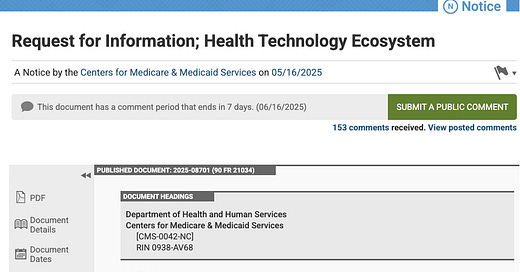What Do You Want from the "Health Technology Ecosystem"? The Government Wants to Know.
This is your chance to let HHS know what you want from health apps and devices, what you think about digital IDs, and how you want to manage your medical records. But you've only got a week.
The Department of Health and Human Services has issued a Request for Information (RFI) on the Health Technology Ecosystem that invites not only health sector insiders but also the general public to respond to questions about their experiences with health technology and how they’d like to see it work in the future.
HHS’s purpose is to get feedback on everything from digital medical records, digital IDs, and health information networks to personal health apps and devices. The comments submitted will be used to inform how the government shapes policies, regulations, infrastructure, and technology in the health sector.
The RFI was issued specifically by the Centers for Medicare & Medicaid Services (CMS) and the Assistant Secretary for Technology Policy (ASTP), so you’ll find many references to CMS and Medicare throughout the document. However, responses to it will be used to inform not just Medicare policies but also the “broader health technology infrastructure” of the country.
The RFI was published on May 16 in the Federal Register, but since it hasn’t been covered by the mainstream press, you probably haven’t heard about it. (I just ran across it myself, which is why I’m reporting on it so late in the game.) There’s less than a week left to submit a comment; public comments close on June 16.
The document is quite lengthy and presents a list of questions that can get pretty technical. But you don’t have to answer all the questions to submit a comment. Jump to section B. Patients and Caregivers to find a list of questions about patient needs, data access and integration, and information blocking and digital identity. You’ll find some technical topics and jargon there too, but there are also questions that a lot of people will be able to address, like:
What are the top things you would like to be able to do for your or your loved ones’ health that can be enabled by digital health products?
and
What could be the benefits to patients/caregivers if digital identity credentials were more widely used? What are the potential downsides?
You can comment as an individual, and you can also opt to comment anonymously. Take a look at the Commenter’s Checklist for advice on how to submit an effective comment.
If you’re someone with technical or policy knowledge, put a pot of coffee on. There’s a lot to consider in section B. as well as sections C. Providers; D. Payers; E. Technology Vendors, Data Providers, and Networks; and F. Value-Based Care Organizations.
RFI Indicates HHS Policy and Tech Directions
The RFI doesn’t just request information. It also provides some insight into the policies and technology we can expect to see the government promote going forward, especially in the area of health data.
Here are a few things I’ve gleaned from the document:
HHS will ramp up construction of the health information superhighway. We’ve been building the internet of health information for years, but the current administration sees its completion as fundamental to its “MAHA” mission of improving the nation’s health. It wants to “ease health data exchange and promote innovation in consumer digital health products,” and will put the regulations and market incentives in place to achieve that.
That means individuals will see a proliferation of user friendly ways to access extensive information about their own health any time, anywhere. It also means authorities will have more access to that information, given current laws and regulations.HHS wants everyone to use digital IDs. Standardization and security are the keys to creating a data infrastructure that allows health information to flow freely between apps, devices, patients, providers, and everywhere else in the health information ecosystem.
It’s clear from the RFI’s questions about digital identity that HHS wants to encourage everyone to use a standard digital ID for access to their health information and devices.HHS is all in on value-based payment. HHS Secretary RFK Jr. has been making glowing remarks about this payment structure since his Senate confirmation hearing, and the RFI follows suit, explaining that the “transition to value-based care (VBC) represents a cornerstone of CMS’ strategy to incentivize improvements in health outcomes rather than increases in service volume.”
Value-based payment and value-based care are related concepts that refer to structuring payment for medical services according to financial incentives and rewards for meeting performance goals, instead of using a fee-for-service structure.
This approach relies on extensive data collection in order to assess how well providers are meeting goals, and there is generally no public transparency about what providers’ financial incentives are. Some critics also say it is ineffective at lowering costs for consumers. One of them, Sanjula Jain, recently took a job at the FDA, but that doesn’t seem to have dampened the department’s enthusiasm for value-based payment.
While the mainstream press has ignored the RFI, there has been a fair amount of coverage by health sector media. If you’re interested in an in-depth analysis of how health sector stakeholders will respond and lobby on the issues raised by the RFI, take a look at this article by Trey Rawles:


